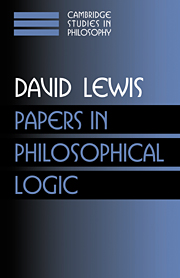Book contents
- Frontmatter
- Contents
- Dedication
- Introduction
- 1 Adverbs of quantification
- 2 Index, context, and content
- 3 ‘Whether’ report
- 4 Probabilities of conditionals and conditional probabilities II
- 5 Intensional logics without iterative axioms
- 6 Ordering semantics and premise semantics for counterfactuals
- 7 Logic for equivocators
- 8 Relevant implication
- 9 Statements partly about observation
- 10 Ayer's first empiricist criterion of meaning: why does it fail?
- 11 Analog and digital
- 12 Lucas against mechanism
- 13 Lucas against mechanism II
- 14 Policing the Aufbau
- 15 Finitude and infinitude in the atomic calculus of individuals (with Wilfrid Hodges)
- 16 Nominalistic set theory
- 17 Mathematics is megethology
- Index
9 - Statements partly about observation
Published online by Cambridge University Press: 05 June 2012
- Frontmatter
- Contents
- Dedication
- Introduction
- 1 Adverbs of quantification
- 2 Index, context, and content
- 3 ‘Whether’ report
- 4 Probabilities of conditionals and conditional probabilities II
- 5 Intensional logics without iterative axioms
- 6 Ordering semantics and premise semantics for counterfactuals
- 7 Logic for equivocators
- 8 Relevant implication
- 9 Statements partly about observation
- 10 Ayer's first empiricist criterion of meaning: why does it fail?
- 11 Analog and digital
- 12 Lucas against mechanism
- 13 Lucas against mechanism II
- 14 Policing the Aufbau
- 15 Finitude and infinitude in the atomic calculus of individuals (with Wilfrid Hodges)
- 16 Nominalistic set theory
- 17 Mathematics is megethology
- Index
Summary
Some statements are entirely about observation. An uncompromising empiricist might say that these statements alone are meaningful; but in that case, theoretical science shares in the downfall that was meant for metaphysics. An uncompromising empiricist might tough it out: science is indeed meaningless, but yields meaningful theorems; or it is entirely about observation, after all; or some of each. But it seems, rather, that science is partly about observation and what we can observe, and partly about the hidden causes and minute parts of what we can observe. And it seems also that science is a package deal, which cannot credibly be split into one part that is meaningful and one part that isn't.
The sensible empiricist, therefore, will retreat. Statements entirely about observation may remain at the core of the meaningful, but scientific statements also will be admitted. Collectively, and even individually, these are at least partly about observation. For an empiricist who wants to be a friend to science, that had better be good enough.
One empiricist who sought to eliminate metaphysics but spare science was A.J. Ayer. Meaningful statements need not be entirely about observation.
… the question that must be asked about any putative statement of fact is not, Would any observations make its truth or falsehood logically certain? but simply, Would any observation be relevant to the determination of its truth or falsehood? And it is only if a negative answer is given to this second question that we conclude that the statement under consideration is nonsensical.
(p. 38)Dissatisfied with this use of the notion of evidential relevance, he offers a ‘clearer’ formulation.
- Type
- Chapter
- Information
- Papers in Philosophical Logic , pp. 125 - 155Publisher: Cambridge University PressPrint publication year: 1997

